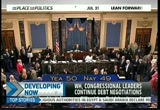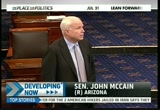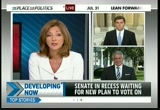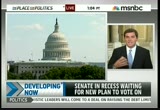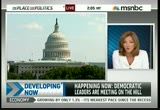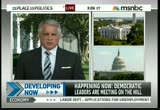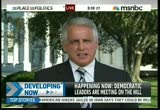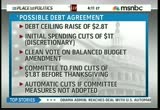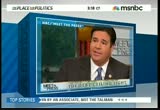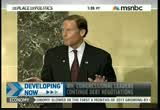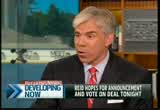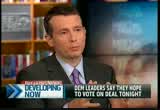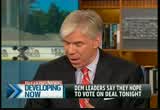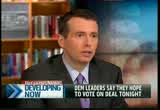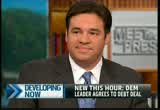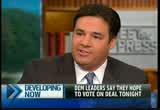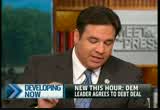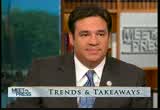tv Will You Kill for Me MSNBC July 31, 2011 1:00pm-3:00pm PDT
1:00 pm
1:01 pm
some optimism. more optimism than we've seen in recent days. but at this moment they're still talking. we don't have details. good afternoon, i'm chris jansing. welcome to msnbc's special coverage of the debt debate. as we continue to watch what's going on, particularly in nancy pelosi's office as we have for the last hour or so, very consequential negotiations going on. earlier today we heard lawmakers may be close to a deal to raise the debt ceiling and avoid default. the senate had issued a procedural vote on another debt plan. they're trying to fast track any eventual compromise. then senate majority leader harry reid released the senate telling them further votes are possible sometime today. >> if there were to be a vote, i assume we would have significant notice for our members because many members would probably like to leave the capitol if we're not going to be voting. >> i would say to my friend, that's the appropriate thing to do.
1:02 pm
i would not suggest a ball game, though. maybe closer than that. >> they've had maybe almost enough time for a ball game at this point, but obviously that's where it stands. they're waiting to see if they get called back. earlier in this session, there was some animated back and forth between republican senator john mccain and his democratic colleague dick durbin. >> does the senator from illinois agree that most likely that agreement will not have an increase in taxes associated with it, at least in the short term? >> i hope not. >> you hope so? >> i hope that there's revenue included in any agreement. >> well, everything that i have heard is that the agreement does not have tax increases in it. has the senator heard differently? i mean, being in the leadership -- >> i honestly am not party to this, but i can tell you that as gang of six and fiscal commission, we believe everything should be under krrgs consideration to reduce national debt. >> dick durbin by the way is one
1:03 pm
of the people in the meeting we're told in nancy pelosi's office. the senate minority leader, mitch mcconnell, said earlier today they're really, really close to an agreement, but the majority leader harry reid told reporters a short time ago, quote, going into pelosi's office we still have a few things we're still working on. they're simply not done yet. nbc's luke russert is on capitol hill. mike viqueira at the white house. luke, i don't know if you had a chance to listen a few moments ago. i was talking to kathy hochul who won in upstate new york. >> reporter: in buffalo, chris, in god's country. >> why did i think you wouldn't remember that? of course. so she said she wanted to have a town meeting yesterday. obviously couldn't. had to stay in washington. she said, so, i'm going to have a phone town hall. 6,000 of her constituents called her. which seems to me to be a pretty extraordinary number. give us a sense before we get
1:04 pm
into the minutia of what's going on right now and some pretty intense moments that we're having. do you sense, luke, on the hill, that members of congress are feeling the pressure from home? >> reporter: absolutely. and that started last week. remember, chris, that some folks that pay attention to this debt limit. it's been a very complicated issue. not only for those of us in the media but also members of congress and especially the american people to understand just the gravity of the situation. however, since the president went on and gave a primetime address and speaker boehner gave a primetime address, the issue has been at the forefront of all the newscasts. that's when, according to members i've spoken to, especially when the president said call your member of congress, have the nation's eyes been fixated on this debate. yesterday for the first time when it looked like there was a terrible, terrible stalemate was really when i was talking to republicans and democrats that both said privately, you know what, this is going to be very embarrassing for us that we come across as this government that's
1:05 pm
just besieged with dysfunction, with the inability to do anything. and when it gets to that level, both sides are open to challengers. both sides are open to the throw the bums out type of primary candidate. so that definitely, i think, was imprinted on the minds of politicians up here on capitol hill over the last few days, especially in the house of representatives where you're so much in tune with people. even in the united states senate. it definitely did make some sort of a difference in the sense that folks realized how just poor they're viewed by the general public. however, it certainly hasn't expedited the process to get a debt limit extension passed as we're going to go all the way up until the final possible deadline which seems to be a rite of passage senior anything that has to do with the budget these die days in washington, d kris. >> i wonder, mike, are we looking at going all the way to tuesday? harry reid said going into nancy pelosi's office we hope to have
1:06 pm
something for the markets before they open tomorrow morning. >> reporter: right. best case scenario, i think tuesday deadline. the deadline is midnight between tuesday and wednesday. the best case scenario any way you look at it, we're going to be brushing up against it. for no other reason, because of congressional procedure, because of arm twisting that in all likelihood is just getting started now as the democratic leaders meet in nancy pelosi's office on the house side. i mean, they're going to have defections galore from both ends of the political spectrum, from the progressives, the liberals on the left who are angry and continue to be angry that their entitlement programs, medicare, medicaid and social security, in particular, have been put on the table by no less a person than the top democrat in this country, president obama. and republicans who feel as though all the call stenices, everything they were promised, all the votes put on the house floor, and the very reason they were elected and john boehner holds the speaker's gavel to
1:07 pm
begin with. it's not going far enough. many are going to feel it was significantly watered down whatever comes out of the senate. we're waiting to hear exactly what those details are. we've had a rough outline throughout the day. the more time goes on, the silence becomes eery here. marry reid adjourned the senate temporarily. if there is a deal, we would expect to hear from the president. i think that's a fair assumption. if there's not a deal, we might expect to hear from the president. i think that's also in the ballpark here. obviously it's crunch time. the ground is rushing up. the markets open -- you know, last week at this time we were talking about the asian markets. everybody is concerned about them at this point. at a minimum they're going to have to get this bill on the floor of the senate, let everybody know it has the votes to pass then hope for the best in the house of representatives. remember, they have to pass this, too, chris. >> reporter: and chris, on that point, if i can jump in there on what mike said ant the house, is
1:08 pm
we've heard so much today about, oh, there's a deal on the horizon, a deal is going to be made. a deal will most likely come out of the united states senate. that's what all signs point to. this is a very -- it's still a very, very far away from happening in the united states house of representatives. the reason being, as we speak, i just got an e-mail, the house progressive caucus is having an emergency meeting tomorrow. most likely going to say they should vote no on this plan. a lot of the folks of the tea party members i've spoken to are not happy with this plan. so you're basically having the left and the right, the two most extreme parts of each party are now sticking out their positions against this. and just watch. the liberal blogosphere is going to start writing about it. right wing radio tomorrow is going to start talking about it and why it's a bad deal and corrupt bargain. once both of those sides apply pressure to the members, the longer this thing sits out there in this holding pattern, the
1:09 pm
ha harder it is to get through the house of representatives. when a deal is made, expect it to be ex-me di ppediteexpedited. the longer you wait, the more people start beating the drum about a deal they don't know what the real facts are yet. it kind of adds this perception this thing is not fair to their cause. that's really worrisome from one aide i spoke to, to the leaders on both sides. they know how much harder it will be to reach the magic number of 216 on tuesday whenever it gets to the house. >> let me go back over to mike. you mentioned this. do you think there's a decent chance we'll hear from the president today either way. >> >> reporte >>. >> reporter: i do. that's informed speculation. let's get back to the point why democrats might be against this or disappointed in the way this has worked out. that is, there's no guarantee revenue is going to be on the table as they define revenue,
1:10 pm
chris. we hear this term a lot as a euphemism, revenue. democrats see it as raising taxes on the wealthiest americans. we should hasten to add the bush tax cuts that president obama came to an agreement with mitch mcconnell last december to extend them last year for the wealthiest americans, this agreement as far as we understand would not touch that. those would expire on schedule. however, when this joint committee, this super-committee, as they're calling it, meets over the next six months and coming up with their recommendations, republicans are insisting today no new taxes will be part of it. how they define revenues is when you overhaul the tax code and close loopholes and simplify the tax code and lower the corporate tax rate and individual income tax rate and do a number of things, people at cbo and economic experts say that will enhance economic activity, bring more tax revenues into the country. that's where they're making the distincti distinction. the bite you played with senators mccain and durbin on
1:11 pm
the floor, that was a little bit of john mccain sticking one of the top democrats, number two democrat in the senate, on this issue of revenue raisers. trying to point out to every democrat across the land who was listening to that that republicans have still not agreed to raise taxes at least as democrats would understand the term. >> yeah. interestingly enough, that, again, you know, going back to luke's good friend, the congresswoman from buffalo, she said her republican constituents are saying, why aren't you raising taxes on the wealthy? that's how she reports out of that big phone call yesterday, that town meeting. thanks, guys, we'll talk again soon i'm sure. joining me live, msnbc political analyst richard wolffe. richard, what does this stand as you see it right now? >> well, still going through the details, i'm told, of this trigg trigger. that's going to be important especially for the president's constituen constituency. for progressives to figure out what they've given up here. what are they losing? as luke was saying, what does that do to the house democrats who may or may not be able to vote for this?
1:12 pm
there are really important details still to come. we all expect there's going to be a deal. in the end, from the president's own framing of this a little less than a week ago, this isn't a balanced deal in the sense revenues are part of this at this stage. there is a promise out there or a suggestion from the white house that taxes will be dealt with when they look at how the bush tax cuts expire, but that's a long way down the road for many progressives. >> let's talk about the progressives, because congre congressman who heads the progressive congress came out a little bit ago and said, i will not back this deal. what is it going to take for the progressives to get on board with this? >> if you look at what this trigger is supposed to do, it's supposed to say if the commission that's being set up to look at deficits, if that commission's proposals are not accepted, there will be consequences that are supposed to force the vote, force both
1:13 pm
parties to come together on this one. at the moment the trigger is just about spending cuts. it does not add anything on taxes as far as we understand it, which would compel republicans to get onboard with what the commission proposes. if you don't have that balance going in, then how can you have balance coming out with what the commission proposes? that is the fundamental issue here, and it's not a small one. it's arcane. it's complex. coming off three weeks of complexities. unless there is balance, and it's balance not just what progressives say, it's balance as the president has teed this up in that address to the nation last month. if the balance isn't there, then it's very, very tough sell for democrats. >> you know, earlier today, midday, late morning, there certainly was a sense with the comments that we were getting from people from mcconnell to schumer that this deal might get done today, that the president might come out and announce a deal today. as we sit here at 4:13 eastern time, do you think that's still a possibility? >> i'm very skeptical that
1:14 pm
something's going to come out now. look, this is difficult. people have to be brought onboard. there's no point announcing a deal then going to have to renegotiate it because the votes aren't there. we saw what happen to john boehner last week. this is going to go to the deadline and beyond it. it will be tuesday before this gets wrapped up. what are they going to announce before monday? i'd be surprised if people go out there right now. people don't need that much time to recognize what works here. what works is playing hardball. it's taking this beyond the brink of the cliff and when democrats were faced with that, for instance, on defunding the war in iraq, they were sold pull back, don't be extreme. well, the tea party has shown that being extreme and being tough works. so we're going to go through a whole new round of people being as hard as they possibly can in these negotiations. >> i suppose it depends on your definition of what works is. because it may work to try to get more of what it is you want, what it does for the economy and
1:15 pm
for the american people who are so fed up is another thing altogether. richard wolffe, it's always great to talk to you, my friend. thank you so much. >> thank you, chris. a debt deal may rise or fall by a very close margin. a big part of that could be the role the tea party plays. you just heard richard referencing it. coming up after the break we're going to talk to a congressman who's part of the tea party caucus and get his take on where we are right now.
1:18 pm
if your speaker supports the compromise they're negotiating today, will you vote yes for it? >> i have to look at it. i'm not sure. >> what has to be in it to get you to yes? >> you know, for me the balanced budget amendment is really important. there's enough members of the house that will probably support it so it can pass. i think the votes are there. >> the votes are there in the house? that's important. >> i think the votes are there for it.
1:19 pm
the majority of the house already voted for this similar plan. >> and that obviously from "meet the press" with david gregory earlier today. republican congressman from ohio, raul labrador saying he thinks, at least at that moment that the votes were there. there's optimism on capitol hill that a debt deal is near. but is it? we're looking at some of the pushback from the progressive side and from the tea party. let's talk to congressman john fleming, republican from louisiana who joins us now from capitol hill. he's a member of the tea party congress. congressman, good afternoon. thanks for joining us. >> hi, chris. thank you. >> can you support this deal? >> we only have an outline of it, as you know. it sounds like it's a combination of the reid/boehner/mcconnell deal. as i understand it, there's several things about it that i could not support. >> tell us what they are. >> well, number one, it may gut military to the tune of as much as $800 billion. we're already right on the edge of a hollow force as it is. it takes away the requirement
1:20 pm
for a balanced budget amendment passing both houses. also the trigger in order to go to give the second tranche of money would be a requirement of a two-thirds override vote to keep the president from triggering that, himself. those are very weak in my opinion. >> let me ask you about the possibility, then, that we could be looking at a tuesday, maybe into a wednesday, maybe into a thursday -- look, i was in louisiana about a week ago, and that's before this even really heated up to the level of it is now. i don't need to tell you how disgusted the people i talked to down there are, people all across the country are. you talk about the possibility of cutting defense spending and we're hearing about literally military folks around the world wondering about what they're going to get paid. are you willing to take this up to and including default? >> well, remember, default can
1:21 pm
only happen if we don't pay the interest on our loans. on the other hand, downgrade probably, or very possibly, could happen anyway. remember, moody's says you have to cut $4 trillion for us to feel comfortable as a safe harbor not to do that. this falls way short of that. there's no reason the president is going to be responsible for who gets paid and who doesn't get paid. that would include social security, retirees, active military. quite frankly, it's up to the president. he can pay them if he chooses to that. >> i don't know if you heard barbara mikulski the other day. she made the point and reflects the view of a lot of democrats, frankly, she said, look, we have given the republicans 80% of what they've asked for. the criticism obviously is there's no sense of compromise on your side, there's no sense of compromise from the tea party. what have you been willing to
1:22 pm
compromise on? >> well, we've come down from the $4 trillion of cut, cap and balance. >> which realistically was never going to happen. you knew that going in. >> well, that's the unfortunate thing because the american people sent us to washington in 2010 -- i was elected in 2008 -- but as you point out, 87 freshmen were brought in, republicans, conservatives, many of them tea party members in 2010 to turn this government around. and they're saying -- many, in fact, tell us, don't raise the debt ceiling at all. so we feel like that we're making a compromise even to be doing that. but having said that -- >> you're not suggesting that the minority of the american people think because the polls don't reflect it, that it's a bad idea to reflect the debt ceiling? >> there's a significant number -- if you look at the polls. i've done polling myself on my facebook which has 28,000 friends on it. a significant number of people, not half, but a significant number would say, don't even raise it at all. we're getting a lot of pushback from americans who say no more debt, no matter what.
1:23 pm
>> but not the majority. >> not a majority, no. >> even -- i mean, just to be fair, congressman, i would think a lot of your friends are people who voted for you or people who tend to be the most conservative so i think it would be fair to say that maybe a facebook poll, for you, would not necessarily be very representative of the country, certainly, and maybe not even of your district. >> well, they're not mostly from my district. they're from across the country. but they do represent tea party-likes, conservative folks. that's my point. the conservative people in this country, tea party people are saying don't do it at all. we're not going to respond to that by doing what they ask, but what we are going to do is make sure before we raise the debt ceiling that we're going to put cuffs on congress and the president and we're going to push forward for a balanced budget amendment so that we don't get into this big mess again. >> what's your thought right now? do you think a deal will get done before tuesday night? >> chris, we're on standby.
1:24 pm
the republican congress right now, we're waiting to hear. we're going to go on a phone conference as soon as we hear. the speaker wants input on this deal. i heard my colleague, raul labrador, from idaho, say that he feels that it's likely to pass under this, but mostly with conservative republicans and very liberal democrats not supporting it. i suspect he's right about that because we barely got the boehner version of the bill, which was kind of a diluted cut, cap and balance passed in the house. that's with democrats not going along at all. so we need democrats to join in if we're going to get anything done. >> louisiana republican john fleming. congressman, thanks for taking the time. >> thank you, chris. coming up, a look at how the debt wrangling could effect the economy. time for your business entrepreneur of the week. john and bill hunter set out to
1:25 pm
streamline the bathroom remodeling business. they created bath simple. a bath in a box concept treating the whole bathroom as a single product. they put the bathtub, toilet, tiles and even the tiniest screws and nails all inside one box. for more, watch "your business" sunday mornings at 7:30 on msnbc. let's do this. look who's early! [ female announcer ] prepare to ace your dental check-up. fight plaque and gingivitis
1:26 pm
and invigorate your way to better check-ups. new crest pro-health invigorating clean rinse. oh, just booked a summer vaycay. ooo. sounds pricey? nah, with the hotels.com summer sale, you can find awesome deals for places nearby. interesting... wow, i'm blown away. you look great. hotels.com summer sale, save up to 30%. and get a free kindle. hotels.com. be smart. book smart. a living, breathing intelligence that's helping drive the future of business. in here, inventory can be taught to learn. ♪ machines have a voice. ♪ medical history follows you. it's the at&t network -- a network of possibilities... committed to delivering the most advanced mobile broadband experience
1:27 pm
to help move business... forward. ♪ how'd you learn to do that? what'd you use? every project we finish comes with a story built-in. it's how our rough ideas become "you did that yourself?" so when we can save more on the projects that let us fix, make, and do more... that just makes the stories even better. more saving. more doing. that's the power of the home depot. add some style to your sink, with this moen banbury faucet for the new lower price of 79 bucks. the clock is ticking. on capitol hill they're racing
1:28 pm
to avoid a default. and obviously we have a deadline coming up on tuesday night. here's what's going on right now on the democratic side. there's still a meeting going on in nancy pelosi's office. harry reid is there, the senate leader along with members of the leadership on both sides. the republicans on the house side are waiting for a phone conference call with john boehner. so both sides are huddling. both sides trying to see if they can come together to make a deal. all of this within the context of earlier reports today that they thought they were very, very close. when we come back, we'll have a lot more information about the potential impact on the markets, also we'll be talking, continuing to talk to members of congress who are there waiting to hear from their leadership. we have you covered right here on msnbc. i couldn't conceive this as a heart attack.
1:29 pm
1:31 pm
energy is being produced to power our lives. while energy developement comes with some risk, north america's natural gas producers are committed to safely and responsibly providing decades of cleaner burning energy for our country, drilling thousands of feet below fresh water sources within self contained well systems and using state of the art monitoring technologies, rigorous practices help ensure our operations are safe and clean for our communities and the environment we are america's natural gas. fundamentally we need to make sure we, as a nation, do
1:32 pm
not default. i don't know members here who want to see a default. we want to prevent default and cut spending. only a small part of this is the debt limit. the bigger, bigger part is the debt. that is a threat to our national security. the chairman of the joint chiefs of staff has said so. >> that was john verasso of wyoming talking to chuck todd on msnbc. let's bring in congresswoman barbara lee, a democrat from california. i know both sides have been waiting to hear from their leadership, congresswoman. this deal as you know it now, could you support it? >> based on press reports, again, we haven't seen any actual formal or official proposal, but based on press reports, it appears that social security, medicare, medicaid, could be up for grabs. and myself along with many members of congress have said over and over again, no way are we going to allow our seen jnio
1:33 pm
citizens to be victims and pay the price of these economic policies they had nothing to do with. i hope this is not the case. we have said over and over and over again that medicare and our senior citizens and medicaid should not be the price that has to be paid to raise the debt ceiling. the debt ceiling has been raised numerous times under republican and democratic presidents. we should raise the debt ceiling, we should go back the next day to the drawing board and determine how we're going to create jobs and, yes, reduce the deficit in a balanced way which means we have to put revenues on the table and look at cuts where they make sense. >> all right. we know that right now nancy pelosi is in her office. she has a high-level meeting. harry reid is there. dick durbin is there. chuck schumer is there. what's your message to them? do you think the way they've negotiated so far and the deal that seems to be on the table that they've let democrats down? >> there have been no greater advocates, no greater voices, no
1:34 pm
greater and tougher negotiators than our leadership, especially our leader over here in the house, nancy pelosi. i do not believe they would allow medicare and medicaid and our senior citizens to be put up for grabs. that, to me, is what the press is reporting is part of the deal. i hope they're over there saying we have a large number of democrats who care like they care about our senior citizens and about the future of this country. and i know for a fact our leadership cares about creating jobs and they know, good and well, that creating jobs is the greatest way to reduce the deficit. but i also know that our leadership will compromise and they need to compromise -- >> have they compromised too much in your view, congresswoman? >> i don't believe our leadership has. i believe they're holding firm on making sure that medicare, social security and medicaid remain solid and that our senior citizens do not have to deal with any cuts or any uncertainty or any type of fear about their
1:35 pm
future. so i'm confident that they're not going to let this happen. when i say compromise, i mean we're talking about when you get into the deficit reduction argument, which should not have been tied to raising the debt ceiling. they understand we have to make substantial cuts, but yes, we have cuts that the pentagon needs to be dealt with. we have cuts that millionaires and billionaires in terms of their taxes, they can afford to pay. we have oil companies that can afford to not have our taxpayers subsidize need mega-profits that they're making. we have many, many ways to engage in reasonable and balanced cuts so we can raise revenue. that's what we must do. again, the jobs argument in talking about the economy and the unemployment rate seems to have been not even existent in these negotiations, and so we have to bring it back home. we have to insist that minimally social security, medicare and medicaid are taken off the table.
1:36 pm
>> the clock is ticking, and -- >> the clock is ticking. and we're not -- >> is something going to get done here? >> i think something is going to get done, but i know one thing. once again, this crisis, and i hope the public realizes this is a crisis that the republican tea party members created. we have responsibility not to default on our debt. and we should raise this debt ceiling like has been done many, many times over and over and over again. and stop holding our senior citizens hostage. and that's what the tea party is doing. that's what the republican tea party is doing. and we're not going to allow that to happen. >> congresswoman barbara lee, democrat of california, thank you so much. >> thank you. now, to get a sense of how the american public might react, here's what one senator said on the floor earlier today, suggesting what people are feeling right now. >> but i understand more and
1:37 pm
more why my fellow connecticut citizens and americans are so frustrated and often appalled by what goes on here. this situation is outrageous. we have an impending crisis, self-created, and devastating possible wounds, self-inflicted, and washington has been deadlocked. >> joining me live now, msnbc political analyst, former dnc communications director, karen finney. robert tranam, d.c. bureau chief for comcast network. thanks to both of you for being with us. let me tell you, every time you two come on i get handed a new piece of paper with new information. i ask you to do the interpretation. here we go, karen. this was handed to me two minutes ago. members of the house progressive caucus have been advised an emergency congressional meeting of members will be held tomorrow, 2:00 in the afternoon. what does that tell you?
1:38 pm
>> that tells me exactly what congresswoman barbara lee was just telling you, and that is that, you know, the progressive caucus has been very firm from the beginning about their concerns in terms of the impact on medicare, medicaid and social security. and part of what i think we're seeing, today, frankly, on both sides is a little bit of leadership getting ahead of their caucuses, which is part of why now both sides are trying to do these conference calls because, you know, people don't like the idea that your leadership has signed off on something you haven't seen the details of yet because you're the one who has to go, you know, take those calls from your angry constituents. so i think what you're seeing with the progressives is wait a second, until we see the details and we are satisfied that the things we care about are protected, don't count on our votes. >> yeah. we just talked to a member of the tea party caucus, robert. he said, look, the balanced budget amendment is still the critical piece for me, still the critical piece for us. so we have this upcoming call
1:39 pm
that john boehner is going to make to his members. give us a sense of what you think that call is going to sound like. >> i think it's pretty much going to be the same as the other side. that is, look, we have to do this. the reason why we have to do this is because our financial future is at stake. what's happening here, chris, two extreme conversations with happening. you have the extreme on the left and the extreme on the right that don't like this. and the leaders, rightfully so, are getting into the room right now trying to figure out how to get out of this situation that they're in. i agree with karen. you know, you have to be very careful. gone are the days of the lyndon johnson days and harry truman says when the leadership would bring the rank and file into a room and say, this is what you think and this is how you're going to vote. that doesn't happen anymore. what you're seeing right now, you have a lot of frustrated congressmen and senators both on the republican side and the democratic side. this is what i think, leadership, this is how i'm going to vote. now it's your job to convince me otherwise. as of right now this is what my constituents are saying, i'm not
1:40 pm
going to let them down. >> it even goes beyond that, doesn't it, karen? i mean, it seems like the days are gone when you got called into the office and and say you wanted a few million dollars for the senior citizen center, we can make that happen, you've been wanting to take a trip to afghanistan, we can make that happen. the old rules don't apply. >> that's right, chris. look, that very important piece of leverage, those little goodies that used to be given out, those are gone. in terms of the kind of leverage that there is, i mean, it's committee, you know, positions and what have you. but, yeah, you don't have that same kind of leverage. you know, i think -- i disagree with robert, though, on something. i don't think the conversation about social security, medicare and medicaid is an extreme conversation. i this is part of what's really frustrating progressives. a majority of americans in the polls again and again and again have expressed -- you saw congressman kathy hochul say this to you earlier.
1:41 pm
they're concerned about what happens to the programs. what's gotten lost in this conversation is, we have all these big numbers. at the end of the day, how is that going to impact the 60-year-old retiree in canton, ohio? i don't think there's anybody who has that answer yet. >> chris, if i can respond. that's very important. karen is absolutely right. there's a human face to all these big numbers. let's be honest here. here's the unfortunate truth. the unfortunate truth is the president's own commission on social security, the president's own commission on medicare has said that the current situation simply does not work anymore, the system will go bankrupt. and what we have to have is a serious conversation about what needs to be cut. not for the current retirees, not for the retirees that are at or near retirement but for retirees -- >> can we have this conversation in the next 48 hours? >> well, that's a serious conversation, but to my point is, is that we need to have an intellectually honest conversation about the future generation, because social security and medicare is not going to be there for them if, in fact, we continue to spend at
1:42 pm
our current rate. karen, let's be transparents here. the president has even said that. >> i think that's right. robert, look, part of what americans are frustrated about is, how can you trust this group of people is going to have a tans transparent, rational conversation in the next 48 hours or give them a week on these kinds of cuts with the rhetoric and biting we've saw? that's part playing into the anxiety americans have, they have to trust this group to have that conversation. >> yeah. i have to say that based on conversations i've had and based on conversations we're hearing members of congress are having with their constituents, frustration and anxiety is a nice way of putting how the american people are feeling right now. karen, always good to see you. robert, thank you so much. to be continued. >> thank you. >> take care. coming up, we're going to take a look at how wall street might react tomorrow if no deal gets done today. and then where we go from here. be kind to your eyes with transitions lenses. transitions adapt to changing light
1:43 pm
so you see your whole day comfortably and conveniently while protecting your eyes from the sun. ask your eyecare professional which transitions lenses are right for you. ask your eyecare professional for your transitions certificate of authenticity for your chance to win instant monthly prizes or our $20,000 grand prize!
1:46 pm
we continue to wait for word from washington as lawmakers are reportedly hard at work on a debt deal that may pass both sides of the aisle. i was handed this from our producer on capitol hill that leader reid and democratic leaders have come out from that almost two-hour-long meeting in nancy pelosi's office. they say they hope to have an announcement and a vote tonight. what might be the sticking points? can they get this deal done? let's bring in our political panel, joining us to make sense of it all, eric nick pike. "washington post" reporter, david. jake sherman, congressional reporter for politico. jake, i'm putting you on the spot. we literally just learned about this information coming out of nancy pelosi's office. what do you make of it? >> i think democrats, it seems like they're going to head to a vote tonight in the senate. i think people are concentrating a lot on the senate and a lot of house democrats. house republicans have been silent. john boehner scheduled a
1:47 pm
telephone call and hasn't said what time it's going to be. it's been radio silenced out of house republicans. you know, these defense cuts which are in the trigger are going to be a problem for house republicans. there's no doubt about that. i'm not sure how they get around that. they've objected to them in the past. it's going to be interesting to see people like allen west, a tea party republican, who voted for john boehner's plan, see if he comes around this time. i think we should wait and see what the house republicans do. >> erin, we're waiting around to see when john boehner is going to make the phone call? that's the critical next piece of this? >> it's not just that. republicans, sure, we don't know where they're coming down. we also don't know where house democrats are going to come down on this either. that's part of what the meeting was about, the democratic leaders meeting in nancy pelosi's office. part of that meeting was that democrats want to see if they can get anymore out of the white house. democratic sources are telling me. because vice president biden and mitch mcconnell are negotiating. democrats feel like they've made too many concessions and want to
1:48 pm
go back to the white house and get a little bit more out of this deal than they can. it looks like house democrats are in a way going to revolt some of the more progressive members, may not come around to support it. what we're looking at it is the house vote which may come up sometime on monday and what the coalition is going to look like of support. whether it's going to be heavier with democratic support or heavier with republican support. right now we don't know what the house vote is going to look like. >> david, we're hearing in the last couple hours from a number of progressives including the leader of the house progressive congress, raul grijalva he will not vote for the deal as it is now. can they go to the white house and get more cooperation from their point of view? >> you saw last night when the president did meet with nancy pelosi that i'm sure that came up as to how much more negotiating room they have. obviously with the clock ticking there's not a lot of room to go forward. but, you know, unless you get some sort of coalition together. and i think right now for the white house, it's a really
1:49 pm
tricky proposition and, you know, frankly for those progressives it looks largely as though the president is going to sort of meet the republicans half way here. >> jake, do you get a sense right now, as we're in the middle of all this, that that deadline is not only doable but it really is the foremost thing that's driving this right now? >> it certainly is. washington always loves a good deadline, loves to do things the last minute. one more point to make. i mean, john boehner isn't going to put a bill on the floor that's going to get very few of his members, politically, internally in the house. he can't be seen as passing a bill with all democrats and a mandful of member s it needs to be something strong enough he can have a sizable chunk of his 240 house republicans. that's also something. you know, he's going to have to look inside the comfort and see where people are along with majority leader eric cantor and kevin mccarthy and see if the deal is doable. getting down to the wire. they're going to be pressed to
1:50 pm
find the votes for this thing. >> do you have a sense with what the number is they can live with? >> it's tough to say. that's something that is a point of speculation. i mean, between 150, 160 probably is this floor, but you know, that's a complete guess. i'm not sure that the speaker's folks would agree with me on that. listen, it has to be something that's the majority of the majority. he's always said, and he told lawmakers that yesterday in a closed meeting. >> thank you so much. jake sherman, david, erin mcpike. thank you. we'll be talking i'm sure again. we're getting word from democrats as we said of a possible announcement and vote tonight. that word coming just minutes ago. we'll have the latest in a moment. she's had these shoes a long time. they're kind of my thing. and they were looking... nasty. vile. but i used tide and tide booster, and look at them now! now they can be my thing forever. yay. that's my tide. what's yours? ask me. if you think even the best bed can only lie there... ask me what it's like... when my tempur-pedic moves... ...talk to someone who owns an adjustable version
1:51 pm
of the most highly recommended bed in america... ask me about my tempur advanced ergo. ask me about having all the right moves. these are real tempur-advanced ergo owners! find one for yourself. check out twitter. try your friends on facebook... see what they have to say...unedited. it goes up... ask me what it's like to get a massage ---any time you want. ...it goes down... ergo...nomics... ergo...nomics... tempur-pedic brand owners are more satisfied than owners of any traditional mattress brand. (in chinese) ask me why i never want to leave my ergo. ask me why i'm glad i didn't wait 'till i was too old to enjoy this. start asking real owners. ask me how to make your first move... find out more about the tempur advanced ergo system! call the number on your screen for your free dvd and information kit. to find an authorized dealer near you, visit tempurpedic.com. tempur-pedic. the most highly recommended bed in america. our girl's an architect. our boy's a genius. we are awesome parents! biddly-boop.
1:52 pm
1:53 pm
1:54 pm
so looks like tonight, at least on the senate side, there will be a vote. the question is, what's going to happen over on the house side? republicans are waiting for a conference call with their leader, john boehner. and we don't know what time that might happen yet. so even though there has been some optimism today throughout the day, there you see chuck schumer, whether or not they'll actually come through with something has yet to be determined. of course, we also don't know what this whole debt ceiling ordeal will mean for the economy over the coming weeks and months. and even tomorrow when the markets open. steve moore of "the wall street journal" joins us now. give us your take on where we are right now, steve. >> hey, chris. what's going to get this deal done is sleep depravation. >> we haven't hit that point yet? >> i'm exhausted. you are. i think the politicians are, too. i think they are going to get this done in the next 24 hours. the question is whether they get this deal done by later today or slip into monday. but, you know, remember, when we
1:55 pm
had the continuing resolution deal on the budget, that went to 11:00 the day before the strike of midnight. this is still dragging on. i think they're going to get an agreement and going to get this done before august 2nd. >> i questioguess the question l they be able to get enough votes? either side? i'm talking, will enough democrats support it on the house side? will enough republicans support it on the house side? how's that going to happen? >> that's a great question. it's a slam dunk in the senate. will probably pass with 70, 80 votes in the senate. you're right. the house is very intriguing. because, you know, the republicans are going to loose about 40 or 50 republican votes because it won't have a balanced budget amendment. so what that means, chris, is that nancy pelosi is going to have to deliver about 40 or 50 or more votes in the house. and to make it more of a bipartisan bill. whether she can deliver those votes is up in the air. remember when we had the t.a.r.p. vote, chris, two, three years ago, everybody thought it was going to pass.
1:56 pm
lo and behold, it failed the first time. >> john boehner is not going to bring this for a vote if he doesn't have the votes. >> probably not. i think if it passes it's going to pass with 220 or above 218. chris, don't forget, everybody wants to vote against this. >> we have 30 seconds left. tell me really quickly, if this does not get voted on tonight, if there's not a deal tonight, what are we going to see in the markets in the morning, steve? >> i think now the market perception is this is going to get done. the question is, chris, whether we'll see a bit of a marked rally tomorrow. now that it looks like finally we're not going to have any kind of closure of the government tuesday morning. >> all right. steve moore, always good to talk to you. thank you, steve. >> great to be with you. we have two big things happening here. we heard the announcement from harry reid. there could be a vote tonight. the second thing we're obviously waiting for is to hear from john boehner who's going to be speaking to his members. keep it here on msnbc for all the latest developments in the debt debate because we are going to keep you posted throughout the night.
1:57 pm
2:00 pm
this sunday, the final showdown over the debt ceiling just two days before a potential u.s. default. as wall street braces for a market shock, will congress and the president compromise before the deadline? and with high unemployment and slower growth, how much more can the economy take? >> the power to solve this is in our hands. and on a day when we've been reminded how fragile the economy already is, this is one burden we can lift ourselves. >> but house republicans dig in. >> i stuck my neck out! >> blaming the white house and democrats for failing to lead. >> it is time for the administration and time for our colleagues across the aisle to put something on the table! tell us where you are! >> this morning, the political
2:01 pm
fight, the end game, and the economic fallout. with us, the president's senior adviser, david plouffe. then, the latest on the negotiations in the senate with senator john thune, republican of south dakota, and senator claire mccaskill, democrat of missouri. finally, the "political roundtable." our focus, the political landscape and the debt crisis. is our leadership bankrupt? and what high economic stakes mean to you. with us, nbc news special correspondent tom brokaw, former democratic governor of michigan jennifer granholm, host of cnbc's "mad money," jim cramer, and a tea party-backed freshman republican congressman from idaho, raul labrador. good morning.
2:02 pm
still an unfolding story here in washington, the battle over raising the debt ceiling has entered its final hours. after weeks of negotiations, pointed political debate, some signs now that a compromise plan between congressional leaders and the white house could emerge as early as today. the senate majority leader, harry reid, postponed an overnight vote on his own debt limit measure and announced late last night that the senate would instead reconvene at noon today and hold off to the vote at 1:00 p.m. eastern time. >> there are many elements to be finalized, many elements to be finalized, and there is still a distance to go before any arrangement can be completed, but i believe we should give everyone as much room as possible to do their work. >> signs of progress also echoed by republican senate leader mitch mcconnell and speaker boehner. >> our country is not going to default for the first time in history. that is not going to happen. we now have, i think, a level of seriousness with the right people at the table that we
2:03 pm
needed and thought we had, as the speaker indicated, last weekend. we're going to get it resolved. >> i think it's pretty clear, should be clear to all of you, that senator mcconnell and i believe that we're going to be able to come to some agreement to end this crisis as soon as possible. >> to the white house now. our chief white house correspondent chuck todd is standing by. chuck, how close? >> reporter: david, they're very close. they've agreed on the framework as far as we know, and the framework is this -- the agreement that the debt ceiling will be raised past 2012, the agreement that we're talking about cuts only, about $1 trillion up front in this first six months and then about $1.8 trillion in cuts for the rest of 2012. now, what had been the sticking point for the last three weeks had been this issue of an enforcement mechanism, what will force congress to do these cuts? republicans, of course, wanted another vote on the debt limit. that is not something the white house wants. so what was agreed to is an across-the-board cut.
2:04 pm
so, if this supercommittee that is created cannot come up with the cuts, there will be an across-the-board cut that will include medicare, it will include the pentagon, and it will be a tough spending cut that would start in 2013 and one that would be painful for both parties, david. >> the sticking point is still the house of representatives. they passed a different sort of bill. compromise does not look likely there. how tricky is that vote? >> reporter: well, the tricky part might be now democrats. republicans feel pretty good about this deal at this point, and so, republicans think they can get a lot of votes, perhaps 180 to 200 republicans, and therefore, you'd only need about 30 or 40 democrats. so, that they feel good about. but david, we're up against a legislative clock and the default clock. so, don't be surprised if there's a temporary extension, if necessary, to get the final details done, because they're not done with some of the details, and some democrats are not happy. >> all right, chuck todd, thank you very much, from the white house north lawn. i'm joined by senior adviser to the president, david plouffe.
2:05 pm
welcome back to "meet the press." >> good morning, david. >> from your vantage point, you're inside the room, is that overly rosy or are you that close? >> well, we don't have a deal. everyone is cognizant, as chuck todd just reported, on both the legislative clock and more importantly, the default clock, so the hours are ticking here. i think what's clear is that there is general agreement that we're going to have deficit reduction in two stages. the first is going to be something the parties largely agree on, about $1 trillion in deficit reduction. the second stage is going to be the trickier elements of entitlement reform and tax reform, which this supercommittee is going to be charged with, and i think it will be incumbent on the members of congress to appoint people to those committees who are going to drive to yes, to try to compromise, get out of their party's comfort zone. >> let me be clear, though, what will the president accept as a deal? >> well, first of all, it's clear, our economy is obviously not as strong as any of us would like it to be. this debt ceiling cloud has harmed our economy. why on earth would we want to go through this again a few short months from now? >> so it has to be through 2012? >> for the economy, number one.
2:06 pm
number two, we want to make sure that if there is an enforcement mechanism -- and again, the committee is not going to be charged with just doing spending cuts only. the committee will be charged at looking at our entire deficit reduction problem and look at things like tax reform and revenue. you want something to compel this committee to act. that was part of the president's approach that he laid out for the country a few months ago, that there would be a debt cap that would enforce action. so, you want to have something that will compel both parties to act, because i do think there is going to be a lot of pressure on this committee to produce something congress can vote on. >> but a lot of people watching are wondering what's actually going on today, what is the fighting about? so, first stage, you cut government spending over a ten-year period to raise the debt ceiling. part of that is a second stage, another committee in washington looks at really making the hard decisions. and then if they don't make the hard decisions, something forces congress' hand.
2:07 pm
so again, what will the president accept as a consequence to force the congress' hand? >> again it might be more enjoyable to negotiate this with you this morning. i can't get into a great amount of detail, but i think that, one, we have to make sure that you can agree on the initial set of spending cuts. the process for the committee, it's essential we think that the debt ceiling get extended off into the future so it doesn't hurt the economy. then we want to make sure whatever enforcement mechanism is something, one, that if it were triggered, you know, you think the country could live with, but secondly, strong enough to compel folks to act. i think you'll see -- this has been a healthy debate. i think the country's learned a lot about our debt and deficit problems, i think there's been some education here in washington, and i think what's clear is, you know, where the president stands is where the american people stand, that if we're going to do another set of deficit reduction, over $1 trillion, they're going to insist it be balanced. because if you're a middle class family, if you're a senior citizen -- >> but there's no tax increases in this. the president said it had to have tax increases, had to be balanced. that's not what's in this deal. >> this committee will be charged with coming up with additional deficit reduction and there's no way to do it without smart entitlement reform and tax
2:08 pm
reform. >> so, you only get to potential tax increases as part of the second stage of spending cuts that a committee has to agree to? >> well, the first stage, it's clear this first stage what we're going to get is an extension of the debt ceiling, you're going to get the first set of spending cuts, over $1 trillion, and then you'll get this committee that's going to be charged with reporting out hopefully a balanced deficit reduction package. >> but what is healthy about this debate? you're talking about another supercommittee. 17 months ago, the president convened a debt commission. the proposed recommendations, which were not acted on by president or congress. now you're talking about another committee. nobody's yet making the hard choices about two-thirds of the budget, which is entitlement spending. so, what's healthy about this debate? >> well, it's certainly not been a healthy debate in the short term. i think the american people are sitting back and saying, you know, i'm going through tough things in my life, and these folks are sitting there arguing with each other, unwilling to
2:09 pm
compromise, particularly the house republicans this week. but i would say this -- the president laid out several months ago a $4 trillion deficit reduction plan. what we were striving to do with the speaker of the house was a big deficit reduction package that wouldn't have a supercommittee. we would have done it right now. that wasn't possible. the speaker of the house pulled by the right wing of his party, walked away from it. but the president's going to be committed over these next few months, as i think members of congress need to be as well, that we need to finish the job here, and the way you're going to finish that job is to have a balanced deficit reduction package that doesn't harm the economy. >> let me ask you some other pressing matters. i've spoken to top figures on wall street who say this is a code red day, all hands on deck, preparing for a market shock as early as tomorrow. what is your message? what is the president's message to investors around the globe this morning? >> well, i think it is that we have to get this solved. today is obviously a critical day. we have to give confidence that there is a pathway to make sure
2:10 pm
that we both reduce the debt ceiling, and let's not underestimate the deficit reduction is an important part of this, so i think -- >> but that doesn't sound like a certain message to investors. should they be swayed by that? >> well, listen, the best way we're going to persuade investors and the american people is to solve this problem. and i think in the coming hours and we're literally talking about the coming hours, i think we can count on congressional leaders to compromise that last bit so we can have a deal that, again, the house republicans, mysteriously, because i don't know anyone who watches this who would think this is a good idea, wanted us to go through this whole three-ring circus again in four or five months. we're not going to do that because it's bad for the economy. >> if we have a default, who gets paid first? how does treasury make that decision? >> listen, at the appropriate point, the treasury department will obviously lay out for the american people how this is going to operate. our focus right now is solving this problem. if we're not able to reach a deal, then treasury's going to have to report to the american people exactly how this is going to happen. >> chairman mullen is in afghanistan.
2:11 pm
he told our troops fighting there he didn't know the answer to when and whether they would get paid. will the president insist that if there's a default, the troops will get paid? >> again, the treasury department -- by the way, whatever admiral mullen talked about, it's outrageous that here we are, 60 hours away from the united states of america potentially defaulting for the first time. and the reason we're here is that, particularly republicans in the house, but republicans generally had been unwilling to compromise. so, at the appropriate point, if we get to that point, the treasury department will lay out clearly for the american people, most importantly for investors, folks around the world, exactly what would happen if we default. >> i want to be clear on what the president would accept in terms of cuts, in the first stage or the second stage. in other words, that what's called in washington a trigger, which means that whatever forces congress' hand, if they don't continue to cut government spending, something would happen. you know the president is open
2:12 pm
to tax increases automatically. would he also accept a deal that would cut social security benefits or medicare benefits if congress doesn't act? >> well, first of all, when you say open to tax increases, let's remember what the president's for, closing tax loopholes, making sure that millionaires and billionaires, large corporations, through tax reform, contribute. what you see the republican party largely wanting to do is ask senior citizens, college students and the middle class to pay all the freight here, and people are outraged by that. everyone's going to have to do their part here. so, in deficit reduction -- and again, this next stage, the first stage is going to be some domestic spending cuts in defense and on defense that both parties largely can come to an agreement on. not easy, but a first stage. second stage is going to be a discussion in congress about things like tax reform and entitlement reform. our view is, things like social security and medicaid, you know, they can't be part of the solution here unless you've got a balanced package that includes tax reform. >> so, we're still at a
2:13 pm
stalemate when it comes to that, in terms of that second stage. another option that's been talked about and there's been pressure from democrats, is invoking the 14th amendment. this is a key piece of the 14th amendment, "the validity of the public debt of the united states authorized by law shall not be questioned." the president can unilaterally raise the debt ceiling. will he do that, if it comes to that? >> we've been asked this a lot, and i think particularly as you come to the closing hours of this crisis, a lot of people are suggesting offerings. there is no offering here. you know -- >> so, the 14th amendment is not an option? >> no. we've looked at that. the only way out of this is for congress to act, for the republicans in congress to be willing to compromise a little bit. you know, the debt ceiling's been raised dozens of times historically. it shouldn't take, you know, a constitutional crisis for us to pay the bills on our credit cards that congress has already racked up. >> the backdrop for this, as you know, is an economy in trouble.
2:14 pm
"the wall street journal" described it this way in terms of economic recovery. this was yesterday. "the government on friday reported that the economy grew at a rate of just 1.3% in the second quarter, failing to bounce back from knocks earlier in the year. estimates of first-quarter growth were also revised down to 0.4%. as a result, the pace of the economic recovery has been one of the worst since world war ii. that's particularly bad news as the economy confronts the threat of a default on the nation's debt." is the obama recovery much more like a bust? >> no. what also was reported this week, is you went back three years, and the depth of the recession the president inherited was even more severe since anyone realized. the worst since fdr inherited the depression. so, we had growth in negative 6, negative 7, just terrible. so, what we have to do is -- now from those terrible depths, we've made progress. we've seen job growth, but not nearly as rapid enough.
2:15 pm
first of all, this debt ceiling cloud not to harm investors, it's going to harm consumer confidence, business confidence small and large. we have to remove this cloud. secondly, congress can do things right now. we can pass trade deals that can help us compete. we can pass a patent reform so that our innovators have an easier time getting their ideas to market. we can work together to build roads and bridges and put construction workers back to work. we have a payroll tax looming, by the way, that would expire next year, about $1,000 tax increase on every american if we don't pass it. so, we've got to get through this debt ceiling for a lot of reasons, but the focus in washington has to centrally go back to how we're going to create jobs, how are we going to grow this economy. >> before you go, you are the president's top political adviser. as you look at what washington has done, essentially a failure to govern, do you now think a third party is a viable alternative in the 2012 race? >> well, that will be up to the american people. here's what i would say -- >> you're the expert inside the white house. >> well, i can speak to this.
2:16 pm
i think that most americans believe that the president has tried to tackle tough problems. i think they're clear that here is a president who is willing to do some tough things, that obviously, we took some criticism from our own party on. so, he walked the walk in terms of how we solve the deficit. someone who's clearly been willing to compromise. and what's interesting is the president last monday night in a speech to the nation and again friday asked the american people to reach out to congress through tweets, e-mails and calls, and say demand a compromise, and the reaction was overwhelming. i think people are very frustrated, and they want their leaders, obviously, to have strong principles. but at the end of the day, as they're going through the struggles in their everyday life, what they can't afford is for their leaders to be engaged in a three-ring circus. >> could it open up a third party or not? >> well, listen, you know, that will be up to the american people. what i'm confident in is that the president's leadership is something that was rewarded in 2008. i think people think he's the one person here who's focused every day on solving problems,
2:17 pm
not trying to score political points, and that's going to be one of the reasons he'll be re-elected in 2012. >> all right. we're going to leave it there. david plouffe, we'll be watching. thank you very much. coming up, more on this deal or default. all eyes on negotiations in the senate as the clock ticks toward a looming debt deadline. so, how does a final deal get done? we'll get into the negotiations. democratic senator claire mccaskill will be here and republican senator john thune. they'll join me next.
2:20 pm
2:23 pm
2:24 pm
well, this is really where the action is right now. it's in the senate. senator thune, as a republican here, somebody who's reportedly in play, what has to be in this agreement to get you to yes? >> well, i think a couple things, david. first, no taxes, spending reductions at least equal to the amount that the debt limit would be increased by, dollar for dollar, and i think a pathway to get a result on entitlement reform. those are the elements that i think a lot of republicans are going to be looking for in order to support a final bill. >> so, you heard david plouffe a minute ago, that mcconnell is saying there's no tax increases in this deal, and that's true, but there is still, again, another committee that's going to look at making the hard decisions about entitlements and tax reform, and the president, you know, is going to look at that committee for tax increases to be part of that approach. >> well, i think there will be some who want to see taxes as part of the approach. i certainly don't, and i don't think most republicans do and i think we believe that if tax reform is a part of that discussion of the permanent committee, and it certainly can be, it ought to be with an eye
2:25 pm
toward broadening the base, lowering the rates, and getting the economy going again. tax reform can be a very useful tool in terms of economic growth, but i don't think tax increases are certainly on the agenda of any republican in the house or the senate. >> can you vote for what's taking shape right now, as you know about it? >> it's hard to say because we haven't seen the details. i don't like where this is headed. i'm not a big fan of the joint committee. but remember, this is probably going to be as good of an outcome as we can get, and most of us will have to accept things we don't like in the final product. >> senator mccaskill, you were in your office yesterday. we have pictures of you on the phone talking to constituents. and you sent a tweet out during the day that caught my eye -- "just spent a couple hours answering the phone in my office. dominant message, don't cut social security or medicare and compromise." and yet, the big fight we know right now is over the enforcement mechanism. again, more washington talk. what it means is you cut a certain amount up front to cut the debt ceiling, and then there's a second stage of cuts that come and there is this
2:26 pm
committee that tries to agree on those cuts. and if you don't do it over this ten-year span, something forces congress' hand. so, how do you not put social security benefits or medicare benefits into that potential enforcement mechanism when they're what are driving the debt? >> well, i think you have to have a lot of faith that the american people are going to continue to weigh in. and here's the bottom line -- this fight has not been about nothing. this hasn't just been political theater. there's a philosophical difference here on the hill between the democratic party and the republican party, and it's pretty simple. they have voted to keep giving taxpayer checks to big oil while they voted to convert the medicare system to vouchers. now, that doesn't compute for us. how can you be more willing to push money, public money, to the most profitable corporations in the history of the world at the same time you're willing to have smaller medicare? so, that's really the fight here. so, if they're not willing to look at -- and you know, john
2:27 pm
and i agree that we can do tax reform, but we can generate revenues there by leveling the playing field, by lowering tax rates for businesses and individuals, but let's get away from the situation where the people who have power in washington don't have to pay any taxes. >> what's ludicrous to the american people, even when the american people don't always speak with one voice on this matter, is that washington is not really dealing with what really drives the debt. that's entitlement spending. that's been going on this way and has been a ticking time bomb since the '60s. and democrats, like you were saying, hey, we can't deal with social security and medicare -- republicans say, you know, sign tax pledges that i'm not going to raise taxes. well, we can't deal with revenues. this is what's ludicrous to the american people. even here, if we have a deal, we'll solve the political problem, but not the underlying fiscal problem which creates our debt, senator, no? >> i think what absolutely drives government spending more than anything else is basically three programs -- medicare, medicaid, social security. you cannot fix this mess in the
2:28 pm
long term, absent addressing those. and what the democrats have proposed, and most have talked about tax increases being part of this as a "balanced approach," but you've got essentially trying to use a balanced approach to one side of the problem. the problem is we spend too much. we have got to rein in these spending programs that are going to drive us over the cliff if we don't do it. that entails entitlement reform. that's got to be part of this debate and solution. >> what enforcement mechanism has to be in the final deal for you to accept this? >> i think some of the things they're talking about right now -- i mean, frankly, in the boehner bill, of course, it was the debt limit increase. you didn't get another debt limit increase until you had a result on entitlement reform. now there is a discussion of across the board spending reductions. i think that makes sense. that puts pressure on both sides to do the hard things in order to get a result. >> could you live with that? >> well, i think we have to make sure there is defense spending in there, because we've got to have something to make the
2:29 pm
republicans begin to look at a more balanced approach. and here's -- >> shouldn't medicare be in there, too, making sure democrats look at a balanced approach? >> absolutely. i'm one of the democrats saying we have to look at entitlement reform, but david, there's a big difference between telling warren buffett we're not going to buy his prescription drugs anymore and converting it to a voucher program. there are things we can do with both social security and medicare that will preserve them, protect them, protect the beneficiaries, protect the benefits, without gutting them. and that's really the case. if we have a balanced approach, we will preserve those programs as we know them and we'll be able to get at our long-term debt structure. both have to be on the table. we can't keep going down a road where they want to keep pushing more public money to big oil but don't want to address the other issues. >> senator thune, september 29th, 2008, was an important debate, an important day. that was the t.a.r.p. bailout of the banks. that compromise legislation was voted down by lawmakers. and on that day, the dow plunged
2:30 pm
778 points. what is your message to particularly your republican colleagues in the house about this debt deadline and the prospect of voting down a compromise? >> i think that default isn't an option. we need to solve this. we need to do it in a way that is consistent with solving the problem, which isn't just the debt limit increase, it is the debt. we have to start making a dent in that, which is why i think republicans in the house and the senate have insisted on dollar-for-dollar reduction in spending to go along with the increase in the debt limit and pathway for entitlement reform. those things will have to be in the plan to pass the house and senate. >> brian williams has a special tonight on "dateline: taking the hill" on the workings of congress in the middle of this debt drama. and he spoke with majority leader reid about that view so many americans have right now. >> the american people seem to be saying to ladies and gentlemen like you, you can't keep doing this. something has to change. this place seems so irretrievably broken.
2:31 pm
>> we're going through a very difficult time. i understand why people are upset. we have to work through it. we need to come together. legislations aren't a compromise. my program that i've suggested that i think goes a long way toward the problems this country faces by reducing the debt by almost $3 trillion. it sets up an idea where we can before that's over do some of the grand bargain that we need. but we need to get beyond this. we can't have our credit rating crash. it would, in effect, be a tax increase for everybody out there. >> for somebody who opposes tax increases, do you agree with that, that ultimately if we see a credit rating slip, the prospects of default, it leads to something akin to tax increases? >> well, i don't think -- we don't know what the rating agencies are going to do, but i know this, the republican approach to solving this is to cutting government and growing the economy, and we believe those two are connected. the democrat approach to this
2:32 pm
would continue to grow government, and i think that's why -- i think claire's right, this is a debate, a broader philosophical debate about the size, the role, the scope of the government in this country, and republicans came here after last election with a mandate from the american people not to make government larger, but to make government smaller and more responsive and more accountable and more efficient. >> quick question about 2012. you know, we've now seen, senator mccaskill, washington going to the brink on shutting the government down, washington again now going to the brink over something more catastrophic, which is a default on our debt. the voters are going to speak next year. you're up for re-election. what's the message they're going to send? >> well, i think -- i hope that more americans realize that what we have to have is more volume from the moderate middle. we had a lot of volume around washington from the two extremes, the talking heads, the cable tv. people who are most agitated are the people who are most divided. we need those people who want compromise. we want those people who want a balanced approach.
2:33 pm
all of us agree on cutting spending. this isn't a deal or our deal. we are at the table with significant spending cuts. what we need now are people in this country that want to say it's not about the tea party and it's not about the far left, it is about compromise. that's when our country shines so brightly. >> senator thune, are you still thinking about running for president? >> i'm not. i made that decision and i'm comfortable with it. >> so a shermanesque statement, you're not running? >> i'm not running. >> would you consider the vice presidency? >> i don't think you rule any options out in politics, david. obviously, when you're in this, you want to serve your country and put your skill set to its highest and best use, and you know, i'm not going to rule anything out, but i'm certainly focused today on what we're doing in the united states senate, which today is trying to get a deal here that will avert a crisis for our country. >> all right. we'll be watching. thank you both very much. and coming up, deal or no deal? has the damage caused by the debt deadlock already been done financially, fiscally? has washington's attempt to come up with a deficit-cutting deal
2:34 pm
exposed a deficit of leadership in washington? our roundtable weighs in. nbc's tom brokaw, former governor jennifer granholm, cnbc's jim cramer, and tea party-backed congressman raul labrador. health probiotic cap a day helps defends against occasional constipation, diarrhea, gas and bloating. with three strains of good bacteria to help balance your colon. you had me at "probiotic." [ female announcer ] phillips' colon health. dr. scholl's custom fit orthotic center recommends the custom-fit orthotic that's best for your tired feet. foot-care scientists are behind it. you'll get all-day relief. for your tired achy feet. for locations, see drscholls.com. thank you...
2:35 pm
2:36 pm
welcome to all of you. jim cramer, i want to start with you. i've talked to top anchors in the country who say there's washington gridlock and there's wall street meltdown. they're preparing for the latter. this is a tough day right now. it's a code red day for many on wall street. describe it. >> well, i think a lot of people are trying to figure out where bills will be paid. a lot of people are trying to figure out what cash is. in other words, there's so much money due, the government owes so much money in the next few days that the banks are wondering who will pay it. will there be a total shutdown? will the president have to order money be printed? will gold be sold at ft. knox? the range of worry is so stagnant that all the great bankers and many of the bank ceos i deal with simply have no idea what will happen. >> if we don't have some kind of framework today that's announced, what could happen in asia, what could happen in u.s. markets by tomorrow? >> we have to go lower. it's just etched in the cards. we felt, by the way, on friday, we heard there might a
2:37 pm
deal this weekend. that kept us come going down 2% to 3%. it's in the cards 2% or 3%, maybe further if nothing is reached. this is global. global. >> tom brokaw, the cover of "the national journal" was pretty scary this week. this is what it looks like -- "damage done." this is financial calamity, potentially. this is also a political meltdown. where are we as we sit here now? >> well, you know, i think this is much more than an accounting or a wall street issue. in fact, this is a critical passage for this country. it reminds me of my freshman year in college. i'd wait until the last minute, pull an all-nighter and then go in there and hope i got it right. and i have to tell you, my freshman year in college was a disaster, so i don't want that to be a metaphor for the country. i'm not very confident about where we are right now, because there's a political default that's already in place, not just in this country, with most of the constituents, left, right, and in the middle, saying they're fed up with what's going on in washington and no longer have confidence in the system. and then you expand that across
2:38 pm
the world. when there was a rumor that greece, a big player in the international economy, might default, look what happened to the markets and what happened around the world because everything now travels at the speed of light. so, this is a sad commentary on our system and our inability to manage the greatest country in the world and its place in the international economy, i think. >> raul labrador, you're a freshman republican from idaho, tea party backed. a lot of your -- and you've been instrumental in some of the talks on the house side, which included a balanced budget amendment, which is, you know, a poison pill in the senate, as you know. do you feel vindicated that you've stuck to principles, or are you aptly criticized for failing to recognize what you and your colleagues are doing that leads to the political default that tom is talking about? >> let's talk about this for a second. we didn't create the problem. the problem has been created by the establishment of washington for the last 30 years. the reason we have $15 trillion
2:39 pm
in debt is not because i was in congress for the last 30 years, because of the people who have been here. and we came to washington to change the way business was done. the american people have told us that they wanted to change the way business was done. mike mullen, who you quoted recently, he says -- >> chairman of the joint chiefs. >> chairman of the joint chiefs of staff. he said that the greatest national security threat to our nation is our debt. >> but we know this. we understand the backdrop. it's a question of how you unwind something so big when there is a real prospect here of real financial calamity. >> and i understand that and if you look at what happened last night and this morning. john boehner has been saying this entire week that the bill he first introduced in the house of representatives was actually a bill that was supported by harry reid. harry reid has been denying it the whole week. he has been not telling the truth the entire week, saying that that was not the bill he was agreed to. then this morning we find out that the only difference between harry reid and john boehner was
2:40 pm
the triggers. that's the only thing, the only distinction. so, now we know that john boehner has been telling the truth the entire week. the bill that he first introduced in the house was the bill that he and harry reid worked on last week. if he would have had enough democrats who would have voted with john boehner, this would have passed on monday and we wouldn't be at the moment of crisis that we're in right now. >> governor granholm, what in the end, senators are a little bit more constrained by the politics and the negotiations, but you heard david plouffe. what, in the end, should be acceptable to the president at this point? >> obviously, he wants to make sure we don't see an extension of this debate for the next few months. we want to make sure it's taken care of. he obviously has said that we don't want to do further damage to the economy and that you have to have a balanced approach. but honestly, and listening to my colleague over here -- not my colleague, but the colleagues of others in the house, and i appreciate being here with you -- we are just talking past one another. and the reality is, what has to happen is i think the tea members have to recognize that they read the tea leaves wrong
2:41 pm
in november, that people sent them here to change, but change the economy, and not put us into default, not bad change, not exacerbate the problem, but change the economy by focusing on jobs. people were angry about the jobs. the friday gdp results only inflates that. but now what they're doing, it is so irresponsible. so, they need to -- i believe the president will accept the deal as it's been outlined. obviously, he's in the room and negotiating heavily. but in the end, what has to happen is that there must be a focus on jobs, and that's going to require some investment. >> let me just go back to tom. tom, you've been reporting on this as well in the last couple days. the reality is that the president wanted tax increases. that's not going to be part of this. but the other reality is, to get an increase in the debt ceiling, they are still going to leave unresolved some pretty tough questions about are there going to be medicare cuts, social security cuts. what are you going to do about
2:42 pm
the big drivers of the debt? >> well, i think that's the critical issue and i think everyone has to stand back and realize that we are all where we are because we are all -- this is not just a democratic problem or a republican problem. the whole country was in on this to get us to this stage. we were in a huge spending binge in this country. everybody was along for the ride for a long, long time. president bush started a war on our credit card. it's been going on for ten years. we have prescription drug benefits for the seniors that are not paid for. the s.e.c. wasn't looking at what was happening on wall street. democrats were pushing house ownership for people who didn't really deserve and shouldn't be buying houses. at the same time, they were not willing to step up on reforming medicare and on medicaid and social security. the country, itself, they were spending money like crazy and they had gotten used to having washington take care of whatever they needed. so, now we're at a stage where i think the country has to come together, david, and say this is a critical passage and we are, democrats are going to have to
2:43 pm
step up on social entitlements and reforming them. i talked to governor kasich of ohio yesterday, republican. he's got his own tough, tough passage out in ohio. he was here in '97 as the chair of the house budget committee. he said we ought to be talking about reform and not just slashing spending. we ought to be reorganizing the government and these programs, because as we mismanage the expansion of government, we can't mismanage now the cutting of government. that's what i really think. >> we're talking about recession, okay? i have never felt since the 2008-2009 period that we'd be anything other than a growth mode coming out, like many of our trading partners, like china, like brazil, like russia, like india, not us. now we are talking about a recession. this is the first time it's been on the table. this is a recession caused by government. it is not caused by businesspeople. they want to build, they want to lend, they want to do anything possible to avoid this recession. the second half, we will be in recession if this is not resolved. recession means many fewer jobs,
2:44 pm
means far few tax receipts. trillions dollars lost, i.r.a. and 401(k), trillions lost in job creation. i'm hearing about little amounts being saved here versus what will be lost in the next six months if this is not resolved. >> congressman, you've talked about something that is fundamental to this impasse, and i want to show it on the screen, because some polling indicates what americans oppose and what they support. this is what americans are for, if you look at the numbers. balanced budget amendment, which you supported. 74% of respondents. the cut, cap and balance plan, which the house passed with the spending caps and the like. but they're also for cuts and tax increases, that balanced approach. but here's what they're opposed to, cutting farm subsidies, cutting pensions, cutting medicaid benefits, cutting medicare, cutting social security. the bottom line is the american people are sending mixed messages. makes it hard to govern. >> absolutely. it makes is very hard to govern. they come to my office and tell me i want you to cut spending, but don't cut my program. i hear that every single day. and the reality is that i want the american people to
2:45 pm
understand two things today -- we will solve this problem. i'm tired of hearing all the media talking about how this is a crisis. we will solve this problem. it will actually happen. and today we will have a plan. it might not be a plan that i agree with, but i think today or tomorrow we will have a plan and we won't go past this date. the second thing, the republicans actually proposed to get rid of all the loopholes already. and the people in the media never talk about it. the ryan budget that was passed overwhelmingly by the house majority in the house actually has a plan for getting rid of the loopholes. i am for getting rid of loopholes. i think it's fundamentally unfair that ge paid no taxes this year, and i think most of the american people agree with me. but what we need to do is we need to lower tax rates and we need to broaden the base so everyone gets treated equally. >> can i pin you down on one point? >> absolutely. >> if your speaker supports the compromise that they're negotiating today, will you vote yes for it? >> i'd have to look at it. i'm not sure. >> but what has to be in it to get you to yes? >> you know, for me, the
2:46 pm
balanced budget amendment's really important, but i think there's enough members of the house that will probably support it so it can pass. i think the votes are there. >> votes are there in the house. that's important because -- >> i think the votes are there for it, because the majority of the house have already voted for a similar plan. >> right, but there'd be no balanced budget amendment, which is how you got to 218. >> but i think you will just lose a few votes and i think it will get out of the house of representatives. >> okay. so would the tea party caucus vote no but will it survive? >> i'm not a member of the tea party caucus. i'm here to represent my constituents and the people of the united states. >> can i ask you a question about idaho? here's an example. i've been looking at the numbers across the country about which states are the beneficiaries of federal aid. you're obviously a big beneficiary for a lot of reasons. you've got the national forest plan. the last numbers i saw, you get $1.28 back for every $1 you send to washington. that 28-cent premium, what would you be willing to give up, how much of it? >> if we got rid of that premium, what we would start doing is controlling our own destiny, and it costs us 30%
2:47 pm
more to use federal money, so i think it would be a wash. if you look at the schools, if you look at the roads, every time you do something with federal money, because of the regulations and all the different things that you have to do, it actually costs you about 30% more. >> you had a balanced budget in michigan. not an easy process. didn't always make you a popular governor, either, in that process. but "the wall street journal" did a look at the entitlement state that has been building since the '60s, and it's another a pretty picture. republicans spent a lot of money on wars in the last decade and prescription drug benefit, but this has been going on since the '60s. "the road to downgrade" was this piece. "by 2010, federal entitlement payments to individuals were 66% of the federal budget, up from 28% in 1965. we now spend $2.1 trillion a year on these redistribution programs, and the 75 million baby boomers only now starting to retire." even if we have a compromise to get us out of this political mess right now and the
2:48 pm
short-term financial mess, we're not dealing with the fiscal problems here. they're still pushing that off because nobody in washington can make those hard decisions. >> i mean, clearly, entitlement question has to be addressed, but i can tell you, david, i cut more as a percentage out of government than any state in the country this past decade. and where is michigan in terms of its economic growth? cutting did not result in economic growth. what results in growth is making sure you've got a good business climate for businesses to grow and prosper. and so, we've got to cut where we can in order to invest where we must in order to grow the economy, and it's that investment side that i worry that those who are affiliated with the tea party or who are on the far right don't realize that other countries are co-investing with businesses in order to create jobs in their countries. if we do nothing more than just cut, that will continue to accelerate the lack of growth in gdp. so, we've got to realize that the strategy here must be very specific. yes, you've got to reform entitlements, but you've got to reform entitlements and invest
2:49 pm
in order to grow, because the quickest way to take down your deficit is through growth. >> david, let's talk about the truth about what happened in michigan. governor granholm actually supported the highest tax increases in the history of michigan, and unemployment went from 6.8% to 15.3%. >> when i took over michigan -- let's not get into an argument about michigan. >> that's the reality. at the same time, you had the governor of texas, who actually supported tax decreases and more broadening of the base, and actually, we had the fastest growth in texas than any of the other states. >> this is a great point, because michigan's economy is emblematic of what's going on in the nation, a global shift in manufacturing jobs. michigan had seven times more automotive manufacturing than other states in the country, and we saw those jobs leave because of this global shift. so, the question for america is what can our nation do to make sure we have advanced
2:50 pm
manufacturing jobs in our country? yes, michigan had a huge concentration of them, you know, we had the biggest bankruptcies in the world inside of michigan. so, clearly, our unemployment e was attached to that. but for the nature, we have to decide how are we going to be competitive globally. >> let me ask jim cramer about all of this. to show you how toxic this atmosphere is, peggy noonan wrote, the president has supporters still, but there is grim support. she writes obama is losing a battle in which he had superior forces p the presidency, the senate. in the process, he rehe vealed that his foes have given him too much mystique. he's a looslooser is nobody lov looser. how has the president led through this? >> i want to talk about how the media exacerbated the problem. he were with all hopeful that the president would come out and
2:51 pm
say a few things. he came out and panicked the heck out of it. he talked about the hire interest rates for mortgages, he talked spiking credit card. he talked about how hard it's going to be on to get a student loan. it took us all back because we felt that he would be a compromise leader. instead he created tremendous fear. tremendous fear means uncertainty which means no spending by businesses, no hiring. it was a setback. he caused the panic, not the media. >> the reality is the president got very close to a deal working it himself and that blew up. he obviously took a different tact here. >> he was working the deal with john boehner. a lot of people thought they would going to get that done. but the speaker couldn't sell it in the house of representativeses. i think it's foolish to talk about winners and losers at this point. there are no winners that i see on this landscape at the moment and we'll have to work our way through a very, very swampy
2:52 pm
piece of washington real estate to see whether we can get to the high ground or not. but obviously this has not been a great time for the president. it's not been a great time for the speaker. if the house does approve the harry reid bill, that will be a little bit of a comeback, but if they reject in the house the reid bill, speaker boehner has had a tough couple of weeks to say nothing of the president. >> i have to disagree with all due respect. in the house of representatives, we actually passed a budget, we passed two bills that would have raised the debt ceiling. and i want to show you, this morning you showed -- you actually saw on this show the failure of leadership of this administration. you asked david plouffe a very simple question. will the military be paid. instead of telling you the truth, what he did is he demagogued. i want to show you real leadership. in 1985, the president of the united states, ronald reagan, was asked the same question. and his treasury department said the secretary of the treasurer
2:53 pm
does have the authority to choose the order in which to pay obligations of the united states. this is an official document. we are aware of no statue or any other basis for concluding that treasury is required to pay outstanding obligations in order in which they are presented for payment unless it chooses to do so. and this president has not been willing to tell the american people that medicare recipients and the military will be paid as long as we receive sufficient money in the treasury. we have to solve this problem. i want to shosolve will problem. but there has been a failure of leadership in this president and all he's doing is scaring the american people. >> we'll take a quick break and come back with more of our round table in just a moment. going to the bank without going to the bank... that's a step forward. with chase quickdeposit on your smartphone, you just snap a picture,
2:54 pm
2:55 pm
the 2nd generation of intel core processors. stunning visuals, intelligent performance. this is visibly smart. a network of possibilities. in here, the planned combination of at&t and t-mobile would deliver our next generation mobile broadband experience to 55 million more americans, many in small towns and rural communities, giving them a new choice. we'll deliver better service, with thousands of new cell sites... for greater access to all the things you want, whenever you want them. it's the at&t network... and what's possible in here is almost impossible to say. ♪♪ ♪ ♪ ♪ look at that car, well, it goes fast ♪ ♪ givin' my dad a heart attack ♪ [ friend ] that is so awesome.
2:56 pm
♪ i love my car [ engine revving ] [ male announcer ] that first chevy, yea, it gets under your skin. ♪ final moments with the round table. david plouffe on this program talking about the key sticking point. will there be tax increases as part of this deal or not? this is what he said. >> what's clear is where the president stands is where the american people stand. that if we're going to do another set of deficit reduction over a trillion dollars, they're going to insist it be balanced because if you're a -- >> but there's no tax increases in this. the president said it had to have tax increases. >> this committee will be charged with coming up with additional debt reduction and no way it to do it without entitlement reform and tax reform. >> is this left deliberately
2:57 pm
gauze zi, will there be tax increases down the road when the committee comes out with recommendations for more cuts on the back end of this deal? >> that's actually one of the problems i have with the deal because i think it is opening the door for tax increases. i think this should be tax reform and i think every member of the house of representatives on the republican sid believes that. i think every person should pay the same rate. i think it should be across the board. and i think it should be fair to all americans. >> jim cramer again a pressing financial question. are treasury bonds safe as we sit here? gr yes, absolutely. don't want toen panic any people on that. still the last resort place to be both for china, they have the pre-ponder ransz of the debt and for americans. >> there is a digital conversation going on and it is disgust with washington. from face bike, eric writes i think we now have elected officials that are afraid of their support bases rather than
2:58 pm
wanting to represent them. why does it seem that compromise is a dirty word. and on twitter from tim, i've never been less confident about the future which is loaded on so many terms. i remember election night in 2010, you talk about independent voters being a movable feast, what kind of message are we heading for next year in the election as a result of a near government shutdown and now near defau defau default? >> it's still very much in play, but the tea party, they played by the rules in american politics. they got angry, they got organized, they got here. and they got what they wanted. and they did it with discipline. whether or not in the long haul it's goodhe larger universe is an open question. if you want to change washington that's what you have to do, you have to get organized around your passions and your interests. and you can't say as the congressman indicated earlier i want you to cut but not my programs. this is a critical time in the
2:59 pm
21st century and we're talking not just about the markets on monday. we're talking about our grandchildren and we're talking about the future of this country as it goes forward in a hotly competitive international environment. during ronald reagan's time, we didn't have china, brazil, india. oil was a think manageable price at that time. >> we'll leave it there. before we go, a programming note. a dateline special tonight. taking the hill inside congress. nbc news sent 80 people 30 cameras to canvas the capitol and capture the drama of this debt fight. brian williams with a there to see it unfold. that's at 7:00 p.m. eastern tonight. more updates as they become available on these negotiations. that is all for today. we'll be back next week. if it's sunday, it's "meet the press." -- captions by vitac -- www.vitac.com
81 Views
IN COLLECTIONS
MSNBC West Television Archive
Television Archive  Television Archive News Search Service
Television Archive News Search Service 
Uploaded by TV Archive on

 Live Music Archive
Live Music Archive Librivox Free Audio
Librivox Free Audio Metropolitan Museum
Metropolitan Museum Cleveland Museum of Art
Cleveland Museum of Art Internet Arcade
Internet Arcade Console Living Room
Console Living Room Books to Borrow
Books to Borrow Open Library
Open Library TV News
TV News Understanding 9/11
Understanding 9/11
